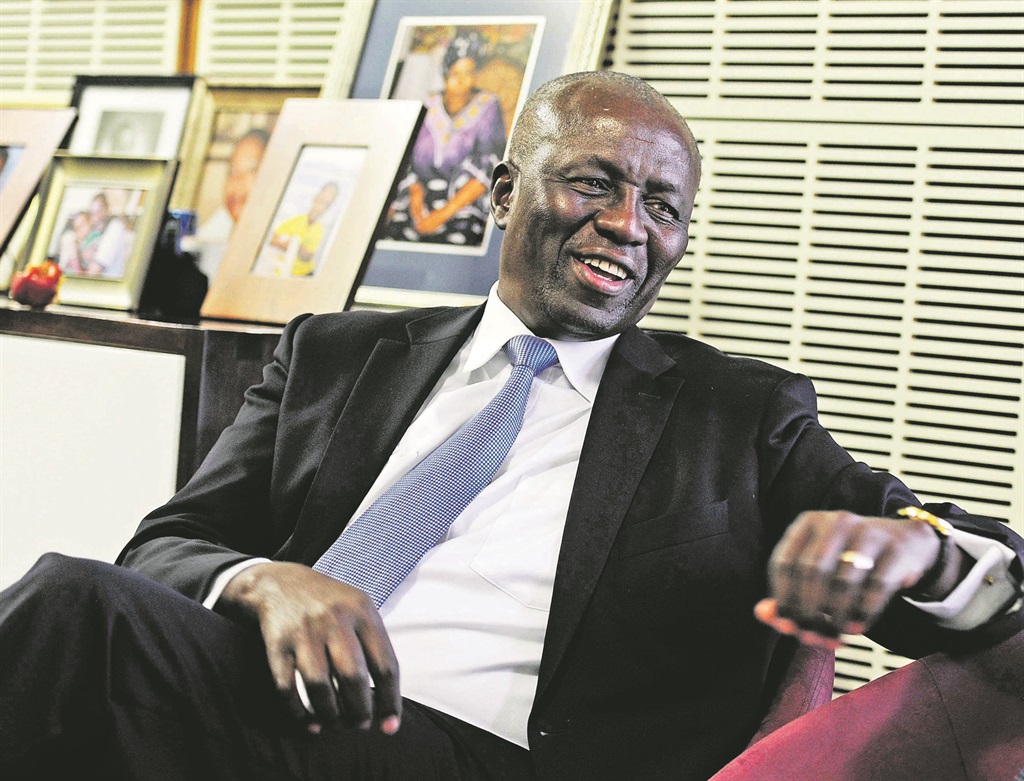
As Deputy Chief Justice Dikgang Moseneke takes leave of the Constitutional Court, we must remember that ‘judges serve the interests of people, not of ruling elites or of political parties’
Every time Dikgang Moseneke’s father climbed on the boat that took him away from Robben Island, where his 16-year-old son was imprisoned, he would cry. His mother, Karabo, would not.
“She saw it as a moment to get through. My mother taught us to soak up pain in life,” Moseneke said at his farewell dinner this week as he took leave of the Constitutional Court, where he has worked for 15 years, 11 as deputy chief justice.
Mme Moseneke, now 91, cut a regal figure at the dinner, where two former presidents (Thabo Mbeki and Kgalema Motlanthe) came to bid farewell to the South African judicial colossus who has helped shaped post-apartheid constitutional law from his perch on Constitutional Hill, Johannesburg.
The former jail has been an appropriate home for the activist prisoner-turned-judge. His disciplinarian father would often tell the young Dikgang: “Go tla siama ngwanake [My child, it will be okay some day].”
And so it is.
We interview Moseneke in his office surrounded by portraits of his six grandchildren, whom he and his wife, Khabonina, live for. His children and close extended family took pride of place with the profession’s finest silks and as many judges as could be squeezed into the farewell marquee on Thursday night.
Student guerilla
Political prisoner
Imprisoned student
Attorney and advocate
Judge
Business leader
Constitutional Court judge
Deputy chief justice
Golfer
Grandpa
About his family, Moseneke said: “The significance of this platform is it gives you a launching pad to go out and make it happen – to serve on a public platform.”
His faith is a similar platform. At the farewell function were five of Moseneke’s pastoral counsellors, two of whom were white, a point he highlighted with a laugh and some pride.
During the many hard moments of life under apartheid and in prison, his mother would turn her family to God. “Let us pray. If you don’t believe, son, I do. Let us pray.”
His was the law of struggle. An instrument “to kick down every door of oppression in my way”, he said. There were many doors. The legal profession made it hard for black attorneys to become advocates; the estate laws had one set of rules for black and another for white.
With his protégé, Vincent Maleka, now a top silk, Moseneke successfully got these overturned as a way of honouring his father, in whose name the case
was brought.
As a lawyer, the young Moseneke trawled the prisons looking to represent detained Umkhonto weSizwe, Apla and Azanla fighters languishing in apartheid’s miserable jails.
“We went there as ambulances of the revolution,” he remembers. He was inspired by AP Mda, Mohandas Gandhi, Griffiths and Victoria Mxenge, Oliver Tambo, Nelson Mandela, Pius Langa and Robert Sobukwe. “I found the crisscross between law and social justice fascinating,” he said this week.
Not every judge has had his arm twisted into service by two presidents. Mbeki used Moseneke’s comrade Mojanku Gumbi to nag the lawyer who had turned corporate titan.
“My idea [for life] was more like a township notion that ‘hey, get out there and get something and pay the debts and the bonds and things’.” He always intended to sit on the Bench, but not so soon. Business life was fun and Moseneke held top positions at Telkom, Nail and other companies. Then Mandela stepped in. At Thursday’s farewell, the judge did a decent impersonation of Mandela telling him: “Dikgang, your people need you.” That was it. The natty suits gave way to the regal green robe embossed with red that Constitutional Court
judges don.
“I can’t imagine my life now without being a judge of this court,” said Moseneke this week. “When I try to rewind and think about these 15 years as a judge, I am unable to think of something that would have filled up my life and impute to it in the way that my role here has proven to be.”
The Constitutional Court is non-hierarchical and its 11 judges sit in a college of equals. “My judgments were to be looked at by the 10 colleagues. The quality of the reasoning, the language, the internal logic … your colleagues are your internal permanent continual peer review mechanism.”
The court’s first years were transformative and reshaping, and it often did the work of striking down laws that were unconstitutional in a new order. Capital punishment was outlawed. Traditional law was harmonised with the Constitution’s commitment to gender equality. The Constitution’s clauses on sexual orientation rights led to significant cases on related rights, most notably gay marriage.
Land, evictions and homelessness
Affirmative action
Estate law: helped scrap apartheid estate law as an attorney
Separation of powers
Independence of constitutional institutions
Hawks
Public Protector
Powers of the president
Anti-retroviral drug treatment
Sexual orientation rights
Gay marriages
Socioeconomic rights, including education and pension
He chuckled at this point, remembering a call after the judgment legalising gay marriage. “I was summoned by a collection of abafundisi and bishops, and things including the cardinal from KwaZulu-Natal, and all of them said: ‘Explain yourself.’ I came to a hall and the place was full. They set me up.”
The governing party, he said, stood behind the court judgments on all the big social transformations its judgments led to.
Moseneke has been an activist judge on land, burrowing into section 25 of the Constitution to excavate the most expansive judicial vision of land reform and restitution. “For me, it is a big thing and I wrote about it a lot. Landlessness inevitably led to homelessness and the challenge persists. We were duty-bound to find ways to ameliorate the impact of the relentlessness of poverty.”
Moseneke also wrote judgments affirming employment equity, which is under attack from conservative civil society in numerous court cases.
The first big challenge the count faced to its independence was when the Treatment Action Campaign applied to the court to compel the government to provide antiretroviral drugs to HIV-positive women.
“For us, as a court, we were called upon to say ‘you may not refuse access to antiretrovirals’. Why? Because the Constitution says so [in the notion of access to healthcare]. And, today, what do we have? One of the best regimes of public treatment around the world.”
So began a more challenging period for the court as it was called upon to intercede in executive decisions. There were many. Cases that contested the legislation to set up the Hawks (which the court found did not enshrine independence in the corruption-busting unit); the appointment of former national director of public prosecutions Menzi Simelane (found to be irrational); the judgment on the powers of the Public Protector (confirmed by the court and in which it found President Jacob Zuma to have breached his constitutional responsibility). In this period, the debate over judicial overreach has raging.
Cases have been heard on how the state deploys resources – in a cornerstone judgment, the court ordered massive changes to how pensions were paid. And now, said Moseneke, we are in an era of “lawfare”, where party political battles are being staged in court. Two spring to mind: the so-called spy tapes case brought by the DA, and the Economic Freedom Fighters referring the Nkandla issue to court.
“He is the intellectual heart of the court,” said Maleka, adding: “His is work of applied craft and the mastery of loneliness [to spend long hours reading and synthesising the record].”
Nine years ago, at his 60th birthday party, Moseneke blew out his candles and blew his chance of becoming chief justice appointed by President Jacob Zuma – a person with whom he does not enjoy the warm relations he had and has with South Africa’s other three leaders. A thin-skinned governing party took apoplectic exception to his statement that judges serve the public, not political parties. The rest is recent history.
On Thursday night, Moseneke repeated the principle again: judges serve the interests of people, not of ruling elites or of political parties – all or any of them. His ethos is threaded into a part of his farewell speech. “Law is an instrument and a tool to produce just and defensible outcomes or it becomes an ass.”
And then he ended as he began. “Too many people are poor and marginalised. Unable to reach their potential. We have to try harder.”
So, what now? There is a personal memoir coming in the next few months followed by a judicial one.
Moseneke believes that despite the turmoil we see around us, South Africa is in a good place, where everyone swears by the Constitution and agrees to play by the rules.
“What they do [after that] is quite another thing, but nobody has said we must renege from it,” he said.
There may be problems, he said, but “over time, our people will self-correct and history backs us on that one”.
TALK TO US
How did Judge Dikgang Moseneke change SA?
SMS us on 35697 using the keyword LAW and tell us what you think. Please include your name and province. SMSes cost R1.50




 Publications
Publications
 Partners
Partners








